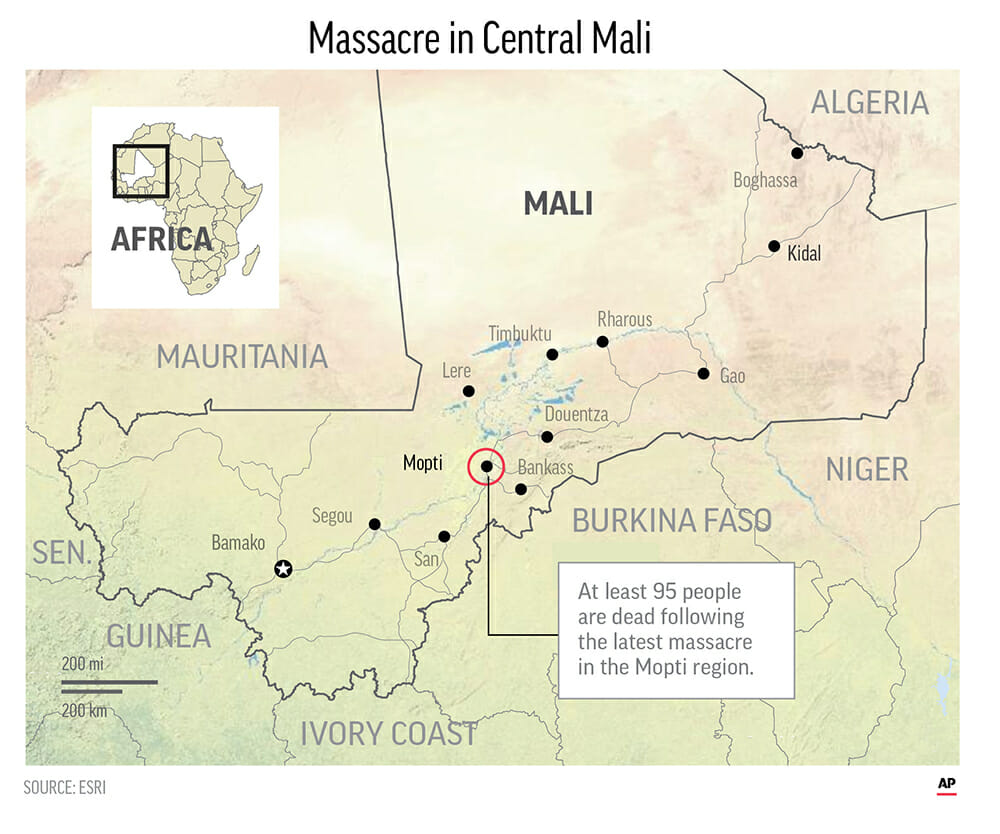
Government: 95 dead in latest massacre to hit central Mali
BAMAKO, Mali (AP) — Assailants raided a central Mali village early Monday, killing at least 95 people in the latest massacre in a growing ethnic conflict that has been enflamed by Islamic extremists, government officials said.
Nineteen people were missing after the ethnic Dogon village of Sobame Da was attacked around 3 a.m., said Interior Security Ministry spokesman Amadou Sangho. Homes were burned and animals slaughtered, the government said.
There was no immediate claim of responsibility, though tensions have been high since a Dogon militia was accused of carrying out a massacre in an ethnic Peuhl village in March that left at least 157 dead. It was the conflict’s deadliest attack yet.
The killings highlight the Malian security forces’ inability to contain the spreading violence, which has been blamed on extremist fighters linked to the Islamic State organization and al-Qaida and the growing danger of frightened communities arming themselves.
Mali has long battled Islamic extremism in its far north, with a French-led military intervention dispersing jihadists from the region’s major towns. The extremists have infiltrated communities much further south in recent years, stoking animosity between ethnic groups in the region with a much larger population.
Some Peuhl leaders had vowed to carry out reprisals for the March bloodshed . A Dogon militia known as Dan Na Ambassagou was blamed for the attack. Militia leader Youssouf Toloba has denied his fighters were involved.
Mali’s president has vowed to extinguish the militia. The massacre in March in Ogossagou led some once-demobilized fighters to take up arms again.
On Monday a prominent group representing the Peuhl community, Tabital Pulaaku, issued a statement blaming the “cycle of violence” on the absence of state authority and impunity for perpetrators of attacks.
“The insecurity and the large-scale massacres exploited by terrorist groups are the seeds of a total and lasting destabilization of the region,” the statement said.
The Peuhl are accused of working alongside jihadists from the Islamic State of Greater Sahara organization to attack Dogon villages and prevent people from cultivating their land.
In turn, the Peuhl have alleged that the Dogons are collaborating with Mali’s military, though there is no conclusive sign of state support.
The groups have not been evenly matched. Human Rights Watch says the Dan Na Ambassagou militia has been behind violence that resulted in much higher death tolls, in part because the group has more sophisticated weapons.
The latest massacre is a reminder that the conflict has no easily defined good or bad sides, the head of the United Nations peacekeeping mission, Mahamat Saleh Annadif, said in a statement. “Everyone is responsible,” he said.
The violence in central Mali is characterized by killings, disappearances and the burning of villages “on an appalling scale,” Amnesty International said Monday.
The U.N. Security Council plans to meet this month on Mali to discuss the renewal of what has become the world’s deadliest active U.N. peacekeeping mission and whether it should focus on the protection of civilians, the rights group added.
Rural bands of hunters have “become paramilitary groups,” arguing that they need to defend their communities if Malian security forces cannot, Jean-Herve Jezequel with the International Crisis Group wrote after the March massacre.
The tensions arose several years ago over issues such as land use, he added.
“The availability of weapons of war and the pretext of fighting jihadist groups have opened the floodgates to a level of ethnic-based violence that is without precedent in the region,” he said.
The victims have included women and young children, and observers say hundreds of civilians were killed last year alone.
In a report late last month, the U.N. secretary-general said Mali’s government must address the arming of ethnic self-defense groups and the proliferation of arms in central Mali or “there is a high risk of further escalation.”
The unrest in central Mali has displaced some 60,000 people, Secretary-General Antonio Guterres wrote.
___
Associated Press Writer Krista Larson in Dakar, Senegal, contributed this report.
___
Follow Africa news at https://twitter.com/AP_Africa
The Western Journal has not reviewed this Associated Press story prior to publication. Therefore, it may contain editorial bias or may in some other way not meet our normal editorial standards. It is provided to our readers as a service from The Western Journal.
Truth and Accuracy
We are committed to truth and accuracy in all of our journalism. Read our editorial standards.
Advertise with The Western Journal and reach millions of highly engaged readers, while supporting our work. Advertise Today.












